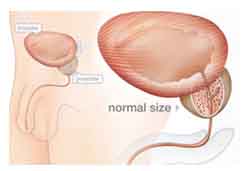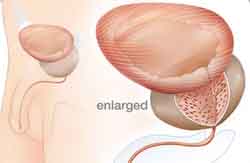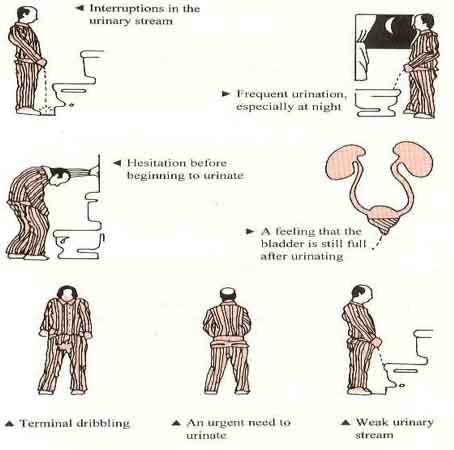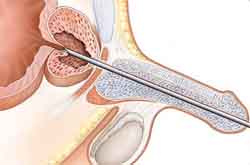Call Us: +91- 88-00-18-19-20
akg.urogyn@gmail.com
Call Us: +91- 88-00-18-19-20
akg.urogyn@gmail.com

Prostate (BPH)
 ....man spends first 50 yrs of his life in making money, and rest of his life in producing water;..
....man spends first 50 yrs of his life in making money, and rest of his life in producing water;..
Prostate is a gland of reproductive
system in male. Nature has partially combined the
urinary passage and reproductive system in human male so that there is a common passage for discharge of urine and semen. This union of two tracts is at the level of prostate gland. Prostate is placed below the urinary bladder in such a way that the proximal part of urethra (the final urinary passage) passes through the prostate gland.
Normally, prostate manufactures certain additives for semen. As age advances, prostate gland undergoes some changes. It can enlarge in size, it can shrink in size; Its shape can change; it can become hard, it can become soft due to infection; there can be calcium deposits; and we know it can have cancer. Any of these natural changes in the structure of prostate quite frequently compress the urinary passage resulting in urinary difficulty.
water which he can't through out...
 Why does prostate enlarge?
Why does prostate enlarge?
Enlargement of prostate (BEP, BPH, BHP or simply and wrongly called PROSTATE) is a part
normal aging process in male. It is essentially under the control of male hormones. It has no relation with diet, activity, life style or any
other factor like social/environmental. There is some genetic factor involved to a very little extent. You are in no way at fault if your
prostate enlarges and presents as a disease.
Can you prevent prostatic enlargement?
No. If you want to maintain your masculinity, you have to live with prostate. Animal experiments show that if testicles are removed before puberty, prostate does not enlarge
 What are the symptoms of BPH ?
What are the symptoms of BPH ?
With aging of prostate, the earliest thing which comes
to the notice of a layman is weak urinary stream. He may experience frequent urination during day and/or night.
There may be interruption of urinary stream. Patient may remain unsatisfied even after passing urine. Urinary difficulty may present
in various other forms. If the patient ignores the symptoms of BPH, one day, there is
complete obstruction of urinary passage resulting in retention of urine.
What is the treatment of BPH ?
BPH in early stage can be treated with medication. Medicinal treatment of BPH does not arrest the progress of disease, but, it makes the patient comfortable and in a way, medicines are used to buy time till BPH reaches at a stage such that surgery becomes essential. Surgical treatment of BPH is definitive.
 What are the modalities for surgical treatment of BPH ?
What are the modalities for surgical treatment of BPH ?
Surgical modalities for treatment of BPH are grouped in to two:-
1. Open surgery :It is out-dated and historical by and large. Used now a days only for a very big prostate not suitable for endoscopic treatment.
:-
2.Trans-urethral:
a).TURP (Transurethral Resection of Prostate): It is a time-tested and well-established technique and unquestionably
accepted as Gold Standard by Urologists all over the world.
(b).TUREVP (Electro-Vaporization of Prostate): It is a little advancement over TURP to decrease the blood loss during surgery.
(c).Laser TURP: Here, LASER is used to vaporize/enucleate the prostate. Various manufacturers of LASER machines are pushing their products
in to the market by creating a lot of hype part of which is justified. KTP Laser, Diode Laser, Thulium Laser and the likes are useful in cardiac
patients who are on blood-thinners and some of them cannot afford to withhold these drugs due to technical reasons. A common drawback of these lasers
is that removal of prostate is usually partial only. Holmium Laser is particularly useful for enucleation of prostate more than 100 gms. However,
Laser industry is trying their best to lure the doctors and patients alike.
Even with evolution of so many advanced techniques, the result of prostatic surgery, by and large,
depends on the competence of the surgeon rather than the modality used
Hospitalization and Bed-rest for Surgery ?
Usually, patient is kept in the hospital for 3 ( + / - 1) days, if there is no other associated major
disease like diabetes, hypertension or cardiac problem. Patient is restricted to bed only for 48 hrs.
Does Prostatic problem recur ? b>
Usually not (if done by a qualified person in a well-equipped hospital). A small rim of prostatic tissue is left at the time of surgery to preserve urinary control. At times, this very portion after a variable period of time (average 8 yrs.) causes recurrence of urinary symptoms. The recurrence may require re-do surgery.
What are the risks involved with surgery ?
Present day surgery for prostate is safe and one of the most gratifying surgical procedures known to mankind.
There is hardly any risk involved which can be directly attributed to prostatic surgery. However, after surgery, there is no discharge of semen at the
time of intercourse, but, man’s potency remains unaltered.
Do I lose urinary control after surgery ?
No. At times, there is poor control over urination which lasts for a few days to weeks.
I have been operating on prostate since year 1988 and I remove approx. 500 prostates in
a year, but, I have never encountered total loss of urinary control in any patient due to
surgery. Out of all the technical options available, probability of loss of urinary control
is maximum with holmium laser (HoLEP). In case there is associated element of malignancy of
prostate, neurological disorder, previous surgery on prostatic urethra, spinal trauma etc.
there can be partial/total loss of urinary control.
Do I become Impotent after surgery for BPH ?
No. There is no effect of prostatic surgery on erectile apparatus. Yes, There will be no discharge of semen at the time of intercourse. This is part and parcel of prostatic surgery irrespective of modality used to operate on prostate. Ejaculation can be preserved by partial resection of prostate, but, in that case you are likely to require re-do surgery after a short time.
I am a cardiac patient; Can I get operated ?
Yes. Now-a-days, prostatic surgery is safe in cardiac patients. But, it should be done only in a multi-speciality hospital having full-fledged cardiac back-up because you never know in advance when it may be required during or after surgery.
What is the treatment of BPH ?
BPH in early stage can be treated with medication. Medicinal treatment of BPH does not arrest the progress of disease, but, it makes the patient comfortable and in a way, medicines are used to buy time till BPH reaches at a stage such that surgery becomes essential. Surgical treatment of BPH is definitive.
Shall I get operated in a stone centre or a Multi-speciality hospital ?
Stone centres are usually small set-ups having just adequate facility for a single kind of job.
A patient of prostate is usually an elderly who could be having problems related to other systems and body
parts which may create trouble during or after surgery. Hence, prostatic surgery is definitely safer in a full-fledged multi-speciality hospital.
I agree that these hospitals charge 10% more, but, they give you a lot in return in terms of safety.
How much does it cost?
The total expenditure on prostatic surgery ranges from Rs. 40,000/- to 1,50,000/-
depending upon the facilities asked by the patient and the technique opted by him.
Usual hospital bill for a nearly blood-less procedure in a private room is Rs. 70,000-75,000/-.
The package cost of TURP fixed by insurance companies is Rs. 51,900/-.